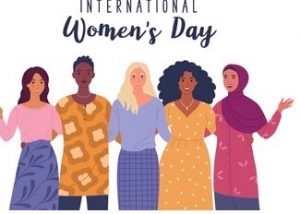International Women’s Day, celebrated on March 8th every year, has been around for more than a century now; but I only learned about it when I lived in Africa for more than five years, twenty-five years ago. In the States, perhaps, people – at least the type of people I knew growing up in comfy, white, suburban New Jersey – didn’t need such reminders of inequality. We had arrived. Or so we were supposed to think.
And, too, where I came from we didn’t give much thought to international issues or causes. My dear Mom, to give one shining example, child of German immigrants, considered the U.S.A. to be the entire universe and our little hometown to be the center of that universe. Why go elsewhere? You might fall off the map, she feared.
According to the website www.internationalwomensday.com, the purpose of International Women’s Day is to celebrate women’s achievement, raise awareness about discrimination, and take action to drive gender parity across the globe. It’s gratifying to me to see that in recent years more American women than ever are waking to the reality that gender parity in the “land of the free” is far from reached. So this day is an important reminder for all of us, everywhere.

In Africa, I remember well, International Women’s Day was a cause for jubilation. The women I knew there made themselves special outfits for the occasion – puffy-sleeved, flouncy, colorful cotton dresses and matching headscarves – and gathered together to dance and sing, and, of course, eat. Despite their often difficult lives, they made this women’s day a day of rejoicing and solidarity.
In Segou, Mali, West Africa, a francophone country where I lived and worked for three years, I volunteered at a women’s center near my home and brought with me to one such March 8thInternational Women’s Day celebration a gaggle of girls from my weekly Club Crochet group. These were little girls who lived in my neighborhood and whom I taught how to crochet one afternoon each week using “yarn” made from recycled plastic bags.
Here is a memory of that women’s day occasion, excerpted from my memoir How to Make an African Quilt (Nighthawk Press, 2013):
On March 8th, International Women’s Day, “La Journée Internationale de la Femme,” which is widely celebrated in Mali, thirty of my Club Crochet girls arrived at my house early in the afternoon. We’d made a date to walk together as a group to Centre Benkady, where an International Women’s Day manifestation (event) was being held.
It would be a women’s-only gathering with dancing and singing, so the little girls, aged eight to twelve, had dressed for the occasion in their best lacey, satiny dresses. Instead of their usual flip-flops, some wore plastic sandals with low heels. Their mothers or older sisters had done their hair in braids, bows, and barrettes. Some of the girls even wore lipstick.
We walked the mile to Centre Benkady in the beating sun, holding hands and singing a marching song I’d just made up: “Nous sommes les femmes et nous sommes FORTES!” (We are women and we are STRONG!), stopping to stamp our collective feet when we got to the word “FORTE!” Aminata’s best friend Bintou translated the words for Aminata (my nine-year-old next-door neighbor and pal, whose strict parents didn’t allow her to attend school) because she did not speak French. Aminata shot me a conspiratorial smile. She knew what I was up to.
What a sight we must have been to the people we passed: thirty lively little African girls in party dresses, led by a tall, thin, middle-aged white woman, all laughing, giggling, singing, holding hands, swinging arms, marching and stomping our way down the hot and dusty roads of our quartier (neighborhood), Pelangana.
Most of the people we passed, I knew, wouldn’t know the words of our marching song because they were probably unschooled and didn’t speak French either. So they smiled and waved at us benignly as we paraded by, as though we were just having fun, playing a game. The girls seemed to know, though, as we marched forth on this March 8th, that this was much more than a game. I was leading a mini-revolution that, I hoped, might grow as these girls grew into strong women.
* * *
Those little girls are in their thirties now. I hope that on March 8th this year they might remember that day together as clearly as I do. For me, this March 8th will be especially significant – my own woman’s day! — because I’ll be moving into my new apartment, my “forever home,” as I like to think of it, in Colonia Independencia in San Miguel de Allende, Mexico, on that day. The six-month-long wait will be over, gracias a dios. If only I could invite some of those Malian girls-now-women to celebrate this day with me so we could all sing again, “We are women and we are strong!” And we’re patient, resilient, determined, and so much more.
~ ~ ~ ~ ~ ~ ~ ~ ~ ~ ~
- HOW TO MAKE AN AFRICAN QUILT: The Story of the Patchwork Project of Segou, Mali (Nighthawk Press, 2013) is available from Amazon.com and from Nighthawk Press (http://nighthawkpress.com/titles/how-to-make-an-african-quilt/ ).
